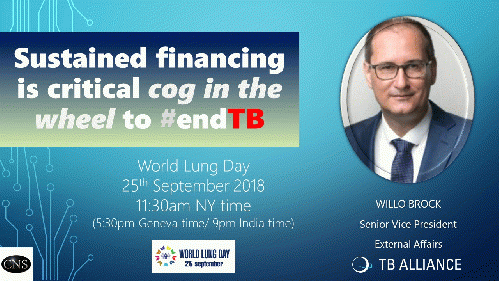
Sustained financing is critical cog in the wheel to #endTB: Willo Brock
(Image by CNS (Citizen News Service)) Details DMCA
- Link to video interview: https://www.youtube.com/watch?v=kRj1FL236Hs&t=32s
(CNS): As per WHO's Global TB Report 2018 financing for TB prevention, diagnosis and treatment continues to fall short of the amount needed and commitments from both domestic and international donor sources need to be stepped up.
Recognising this lack of sufficient and sustainable financing, the political declaration issued by member states at the recent first-ever UN High Level Meeting (UNHLM) to #endTB commits to increase the overall global investments for ending TB to reach at least US$ 13 billion a year by 2022; and also commits to close the estimated US$ 1.3 billion annual gap in funding for TB research, ensuring that all countries contribute appropriately to TB research and development.
Willo Brock, Senior Vice President (External Affairs) at TB Alliance (Global Alliance for TB Drug Development), has extensive experience in resource mobilization in global health. He was in exclusive conversation with CNS (Citizen News Service) on the sidelines of the UNHLM to end TB in New York. Willo provides strategic leadership to the organisation's fundraising, advocacy and policy, and community and stakeholder engagement work.
Here are some excerpts from the interview:
CNS: Why do governments not see investing in TB as a smart business case, despite evidence that for every $1spent on reducing TB incidence can generate benefit of $33?
Willo Brock: "It is true that TB creates huge financial burden on people and economies. Even in those countries where diagnostics and treatment costs are covered by the public healthcare system, families are known to spent about half their income on managing their TB treatment. According to one study, it is estimated that multidrug-resistant TB (MDR-TB) alone would cost the global economy a cumulative $16.7 trillion by 2050 and claim the lives of up to 75 million people. So there is big impetus to act. But the costs and the benefits are not at the same scale. Costs are often borne by poor families and not necessarily by the governments. Also, the investments in drug development do not yield immediate gains as R&D is a long term process. But politicians tend to like short term results and not long term investments that give return over a long time period.
CNS: Why has the private sector not been that proactive in funding the fight against TB?
(Note: You can view every article as one long page if you sign up as an Advocate Member, or higher).





